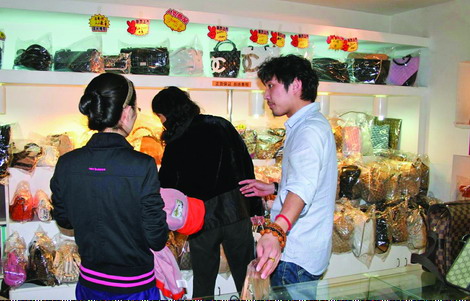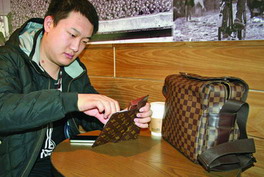
|
 |
|
Yang Xu introduces high-end handbags to a customer in his boutique that sells and rents luxury products. [Photos / China features] |
Ren Jiansong puts paying his rent ahead of buying the pricey luxury goods he so adores - prompting the 26-year-old fashionmonger to frequently rent luxury goods from a Beijing-based boutique. His most recent rental was a Louis Vuitton Damier Naviglio. The brown and tan messenger bag retails for about $1,600, but Ren paid 180 yuan ($29) to borrow one for three days. He also paid 90 yuan to rent a $700 Louis Vuitton wallet for three days. "I can afford to buy any of them, but I don't think the prices are acceptable," says Ren, whose annual income is nearly 220,000 yuan.
|
 |
|
Ren Jiansong rents a secondhand LV wallet and an LV messenger bag. |
The Beijing native knew little about luxury brands before he started working for a fashion store in 2009. He purchased two bags - one by Chanel and one by Dior - and a Cartier ring for a total of 63,000 yuan.
Today, the sales agent travels across China to organize marketing activities for his clients, which include Louis Vuitton, Bulgari and Chanel.
But he stopped buying high-end goods in 2010 after discovering V2, a fashion boutique in downtown Beijing's Guomao area.
In addition to selling new and gently used luxury bags, V2 also offers shoppers a chance to lease used luxury goods - a rare service in China.
To rent goods, a customer must put down a full-price deposit and pay a daily rental fee of about 3 percent of the item's retail price.
To date, Ren has spent more than 60,000 yuan at V2.
"Ordinary people don't have many occasions to use luxury products, so why not just rent one when you need it?" Ren says.
While Ren frequently rents his luxury goods, his peers have become obsessive buyers of such products.
China is the world's fastest-growing market for luxury goods, thanks to years of stable economic growth that has boosted the spending power of superrich consumers.
Forbes magazine reports China had a total of 146 billionaires in 2011 - up 14 percent from 2010 and second only to the United States, which boasts 413 billionaires.
"Actually, many buyers are just attracted by the logos and don't know much about the brand culture," Ren points out.
Chinese people enjoy flaunting their wealth in public and believe quality products emblazoned with world-famous logos represent dignity. But they prefer to own, not rent, says Kong Liang, manager of Oursjia Rental Service Co Ltd's branch in Jiangsu province's capital Nanjing.
"Some rich people show off wealth using luxury goods, while some salaried workers skimp on daily expenses to buy high-end products," Kong says.
The joint venture, which operates dozens of shops in China's mega-cities, offers a wide range of products for lease, including home appliances, furniture, digital products, vehicles and luxury goods. The daily charges for similar goods are almost identical among different shops, so customers do not worry about bargaining, market researcher and V2 co-founder Yang Xu says.
Regular disinfections and repairs also improve customer satisfaction, Yang says.